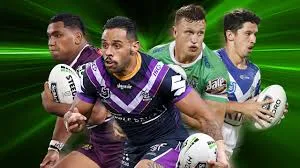Racial Bias Latest: Setting the Record Straight for Aboriginal NRL Sports Players
The recent legal turmoil involving Indigenous NRL players Latrell Mitchell and Jack Wighton has stirred a significant amount of public commentary.
But despite the charges being thrown out due to a lack of evidence and admissions of false testimony by a senior police officer, certain anti-Indigenous commentators have continued to imply guilt, disregarding the facts of the case.
The Implied Guilt
The case has been a focal point for divisive commentary, with some individuals casting shadows of doubt and guilt on the Indigenous NRL players, irrespective of the legal outcomes.
And one such commentator, Graham Hill blatantly implied that the players would escape accountability due to their racial background, stating:
“These drop kicks will get off. Wait till the racism accusations start to flow.”
This insinuation not only dismisses the legal process and the players’ rights to a fair trial but also perpetuates harmful and unfounded stereotypes about Indigenous people.
And Hill’s statement reflects a concerning trend where Indigenous people are often prematurely judged and assumed guilty, a bias deeply rooted in historical prejudices.
But this prejudiced viewpoint disregards the significant evidence brought forth during the trial, including the admittance of false testimony by Sergeant David Power, which ultimately led to the dismissal of the charges against Mitchell and Wighton.
The implication of guilt based solely on the players’ Indigenous heritage is not only unjust but also damaging, as it fuels the fire of racial bias and discrimination… and it undermines the efforts of those striving for equality and justice, casting a shadow of doubt on the integrity of the legal system and the society at large.
Furthermore, the comments from Hill and others who share his viewpoint also ignore the fact that the NRL players, like any other individuals, have the right to be presumed innocent until proven guilty.
But the premature judgment and the implied guilt based on their Indigenous heritage are a stark reminder of the systemic challenges and biases that still need to be addressed in our society.
The Need for a Fair and Just System
The revelations of false testimony and the subsequent dismissal of charges against Mitchell and Wighton underscore the imperative need for a fair and just legal system, free from bias and corruption.
Tom Janson, an MSN reader who could actually read the article unlike Mr Hill, vehemently expressed the need for accountability stating “Those cops who gave a fabricated statement that was contradicted by CCTV should be given a custodial sentence. Utterly unacceptable.”
Janson’s words highlight the gravity of the situation and the vital importance of integrity within our legal and law enforcement systems.
Because when officers of the law engage in deceitful practices, it not only undermines the public’s trust in these institutions but also jeopardises the very fabric of our justice system.
Furthermore, the case brings to light the ongoing issue of systemic bias against Indigenous communities.
When law enforcement officials falsify evidence, particularly against Indigenous people, it perpetuates a cycle of mistrust and marginalisation. And it sends a harmful message that the legal system is not only flawed but also discriminatory.
So the call for a fair and just system is not just about holding individuals accountable for their actions; it’s about ensuring that justice is served impartially and equitably… it’s about rebuilding trust between law enforcement and the communities they serve, particularly marginalised communities that have been historically subjected to bias and discrimination.
Jack Murray, echoing the sentiments of many, called for a thorough review of all cases involving Sergeant David Power. “The sergeant lied. EVERY case where this lying deceitful cop gave evidence that resulted in a conviction now needs to be reviewed,” he stated.
The case of Latrell Mitchell and Jack Wighton serves as a stark reminder of the challenges that Indigenous people face, even when they are in the right or sports “gods”.
So it’s crucial for society to stand against bias, question narratives that perpetuate stereotypes, and demand accountability from all, regardless of their status or position. In doing so, we move closer to a fair and just society for all.




0 Response to "Racial Bias Latest: Setting the Record Straight for Aboriginal NRL Sports Players"
Post a Comment